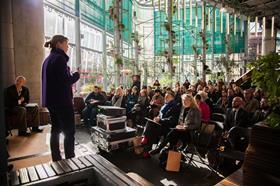
Increasing veg intake has undeniable sales and health benefits, but healthy eating campaigns have so far failed to make their mark.
With a breadth of remit that matches only the breadth of the problem it is addressing, the Peas Please campaign from the Food Foundation is turning into the largest, if not the first, healthy eating campaign that is focused solely on the supply chain and associated food ‘systems’.
Healthy eating is perhaps the first misnomer – Peas Please has distanced itself from consumer-facing dietary campaigns, such as 5 A Day, and instead asserts that for any meaningful change to occur there must be changes across the board, with consumer decisions only a small part of this. The other difference is the campaign’s awareness of the economic benefits that are interlinked, but rarely specifically highlighted, with increasing intake of vegetables.
Explaining why the campaign focuses only on veg, Food Foundation executive director Anna Taylor says: “We chose veg because consumption is declining, and because there are more opportunities for the British economy in veg production over fruit, because we grow more veg in the UK. It’s not just about promoting British produce, but we are aware of the economic win that comes from that.”
Taylor, a food policy veteran who was awarded an OBE for her work with the Department of Health, believes there are multiple barriers to increasing veg intake that are embedded across society. “According to the latest Public Health England advice, we should be eating seven pieces of fruit or veg a day. I think, breathe and dream this stuff and I can’t even manage it – it’s not easy. The average person eats around three to four portions a day.
“There’s been a real shift in how nutrition policy is viewed now – diet challenges are now recognised as food system challenges – but this is one of the first campaigns to put this new thinking into practice.”
The campaign has been divided into eight ‘workstreams’ that tackle veg consumption in different areas, including low income, schools, cities, legislative and financial support for producers, convenience offerings and advertising of fresh produce. Various organisations and businesses from across the supply chain are currently in the process of signing up to one of the workstreams, with the idea to have one or two trailblazers for each stream, who will drive the project and end up with one or two specific ‘asks’.
These will be presented at an inaugural summit preceding the London Produce Show, in June of this year, as a way of kickstarting awareness of the project and moving it forwards. “The breadth of this campaign is part of the point. Everything is so interconnected; to make a change you need to pull on multiple levers at once,” says Taylor, who doesn’t seem daunted about taking on almost every barrier to healthy eating you could possibly think of.
“5 A Day hasn’t delivered a real step change, so we needed something different,” she continues. “We want consumers to eat more veg without realising they are doing so. You have to tackle the food systems, not rely on individuals, although of course they have a role to play.
“The project isn’t just about lobbying, but we definitely want to see some commitment from Defra about helping fruit and veg producers invest for the future, as well as lobbying on regulations for licensing for fast food in a few cities. There are lots of areas where we just need fantastic business leadership.”
Already in talks with the likes of Reynolds, Produce World and the British Growers Association, the campaign has been successful in reaching out to supermarkets as well as foodservice chains, government, trade bodies and other food industry stakeholders.
“We would like to be an umbrella campaign that builds on what has already been done on this topic,” says Taylor. “We have had to work really hard to reach out across the network. It’s no good just focusing on high-end food-to-go chains, like Pret. Where it would really make a difference is getting people like McDonald’s and KFC on board, who are sometimes the only outlet in lower-income areas.
“We would urge produce suppliers to get involved with one of the workstreams, and think about how you can increase consumption of veg just within your little bit of the supply chain.”
It’s easy to confine healthy eating decisions to the individual, but if this campaign takes off, consumer health won’t be the only winner.



